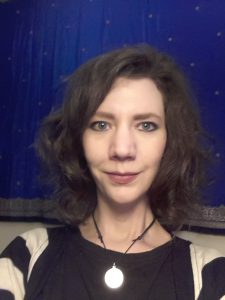ECU Expert Featured in Overseas Newspaper
An East Carolina University professor was recently featured in an overseas newspaper for her research into misinformation and medical care.
Andrea Kitta, an associate professor in the Department of English, was interviewed by the Dutch newspaper Nederlandsdagblad about her research in rumor, fake news, epidemics and medical information.
The newspaper’s story focused on complications that arise during medical care delivery when misconceptions fuel decision making. With 93% of adults in the United States receiving some sort of news online, there are a growing number of opportunities for the general public to receive deceptive information.

East Carolina University associate professor Andrea Kitta was recently interviewed by an overseas newspaper for her research in rumor, fake news, epidemics and medical information.
“This type of research is important because people make medical decisions based on the information they’re reading online,” Kitta said. “The misinformation they receive online through news articles or social media posts replaces actual medical information. It can be difficult to feed people the correct knowledge about their health care options once they’ve been deceived by ‘fake news’ form untrustworthy sources.”
Along with misinformation from online sources, Kitta said receiving anecdotal accounts about health care from friends, family and community members can shape the way individuals perceive medical care.
“People’s experiences heavily shape the way we view health care,” she said. “The stories we hear from other people about what they’ve gone through affect how we discern medical treatment. How many times have you heard a friend or family member say they won’t get a flu shot because one time they got sick after receiving the vaccine? Those sort of anecdotes affect our perception over time.
The Nederlandsdagblad article provided global accounts of how misinformation has affected medical care. In August 2018, an Ebola outbreak began in the Democratic Republic of the Congo. More than a quarter of the country’s population said that the outbreak was a fabrication, believing that the “fictitious” event was orchestrated by the government with the aim of postponing upcoming elections
The distrust led to a series of violent attacks on care providers earlier this year, with the paper reporting that “some (medical) centers (burned) to the ground.”
Other examples included Russians believing the AIDS virus is a myth perpetuated by “the West” and polio cases rising in Pakistan due to parents’ belief that the vaccines are not halal and are part of a conspiracy against Muslims. These beliefs mirror the anti-vaccination movement that’s grown in the United States over the past decade.
“These issues have become really polarized,” Kitta said. “Misconceptions aren’t only based around medical issues now, but political issues as well. That’s harder to combat because they become even more ingrained in a person’s belief system.
“Globally, it’s hard to nail down an individual segment of the population affected by this,” she said. “It seems to permeate through different cultures, ignoring race, education, religion and nationality.”
Kitta believes the first step toward slowing the effect of fake medical news is talking to people.
“You have to find ways to engage people in conversation without shaming them,” Kitta said. “Other countries have put in regulations forcing vaccine uses, but I’m conflicted on that step because people will still refuse because they’re mandated. We have to talk with people one-on-one, listen to their concerns, and then provide accurate information that helps relieve those concerns.”
Spending more time interacting with doctors and nurses could help the problem too, Kitta said.
“One thing we need to do is give more time for patients to talk to their medical providers,” she said. “You have to have the opportunity to discuss information with a trusted source. We also need others to share their personal experiences with these diseases. It’s been so long since we’ve seen some of these medical issues that people forget what it was like. When you hear firsthand how polio or the measles affected a person – and the horrors that went along with those diseases – that can play a powerful role in combating misinformation.”
Kitta’s work in medical misinformation and supernatural folklore can be found online.